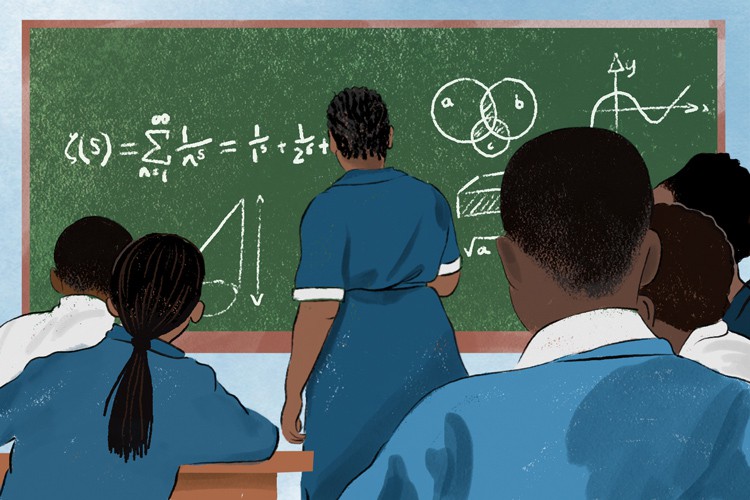
15 August 2023
The vast majority of school children cannot read properly in their home language. Illustration: Lisa Nelson
The latest Progress in International Reading Literacy Study (PIRLS) report, released in May, revealed that 81% of grade four learners in South Africa cannot read for meaning in their home language.
Seen as a desperate attempt to address this, the Department of Basic Education (DBE) has now appointed Dr Naledi Mbude as Deputy Director-General for Special Projects, including African language education. Her appointment has been widely welcomed in educational and academic circles.
“Now that all else has failed, the department is at last turning to trying to address the language issue,” says Carole Bloch, Extraordinary Professor in Language Education at the University of the Western Cape (UWC).
Mbude is a champion of mother-tongue instruction. She did pioneering work at Rhodes University. This showed that learners in a pilot project in the Cofimvaba district of the Eastern Cape, who studied maths and science in isiXhosa up to grade six, outperformed their peers from the same district who switched in grade 4 to English medium instruction.
The fate of about 70% of learners in South African state schools is to switch to English-medium instruction after three years of teaching in their home language. Of the remainder, 24% attend English-medium and 6% Afrikaans-medium schools from the outset.
This switch was described as “brutal” at an Academy of Science of SA (ASSAf) roundtable discussion in June by educationist Crain Soudien, former President of the Human Sciences Research Council. The roundtable was convened by ASSAf President Jonathan Jansen in response to the PIRLS report.
“Learners are starting in English before they have mastered comprehension in their own language,” Nangamso Mtsatse, CEO of Funda Wande, Reading for Meaning, an NGO that provides high-quality materials to support teachers in grades 1-3, told the roundtable.
The PIRLS study was conducted across 43 countries, of which South Africa is the only country in sub-Saharan Africa (Egypt and Morocco are the other two on the continent). While South Africa fared worst of all, reading capability at its schools also varied more than in any other participating country as a function of parental income.
Learners worldwide do the PIRLS test in their home language, but at the age when in South Africa most switch to English instruction. There are stark differences among languages in the reading ability of learners, with African languages tailing English and Afrikaans. But socio-economic factors confound the interpretation of these data, as schools that teach grades 1 to 3 in African languages tend to be located in poorer areas.
The fact that schools with Afrikaans and English as the languages of learning and teaching completely outstrip the other schools, suggests that over the past 29 years the government has done little to address historical inequalities in education.
Jansen believes that more parents should be given the option for their children to attend state schools where they can be taught in English for the entire duration of the curriculum.
“Right now our children are failing to read in any and all languages, so why burden them with two or three instructional languages while educational progress and economic opportunity depends solely on fluency in English?” he wrote in the Sunday Times.
But others disagree. Russel Kaschula, Mbude’s former supervisor and now Professor of Forensic Linguistics and Multilingualism at UWC, says that learners should be taught content subjects, such as maths and science, in their mother tongue for at least the first six years, as both Mbude’s and similar research conducted in Nigeria show. This is because mother tongue instruction facilitates conceptual cognition, while English should be taught in tandem as a language subject.
He believes that this model can also allow for translanguaging, where English can be introduced alongside an African language in content subjects, but the emphasis must be on the mother tongue. “The mother tongue must be the point of departure as with most countries in the world,” says Kaschula.
The DBE has been heavily criticised in Parliament for failing to implement the National Reading Plan which was announced by President Ramaphosa in 2019, following a similarly poor performance by South Africa in the previous PIRLS assessment in 2016. So Mbude will have her work cut out for her.
Mbude is no stranger to controversy. After less than a year in the job of provincial superintendent-general of education she was suspended by Eastern Cape Premier Oscar Mabuyane in 2022. This followed her giving incriminating evidence relating to provincial education department practices to a portfolio committee.
The Covid pandemic hit the country’s youth the hardest, with youth unemployment growing by a quarter of a million people over the past three years. In this context the Department of Higher Education and Training has identified a lack of “reading comprehension” as the most important skill deficit in the South African labour market.
Language aside, there are other issues which need to be addressed urgently if this is to be improved. The bua-lit collective of local educationists has outlined five practices which could have an immediate impact on improving literacy among children. The first of these is that every foundation phase classroom should have libraries containing books, both in children’s most familiar language, as well as English, from which children must take at least one book home every day.